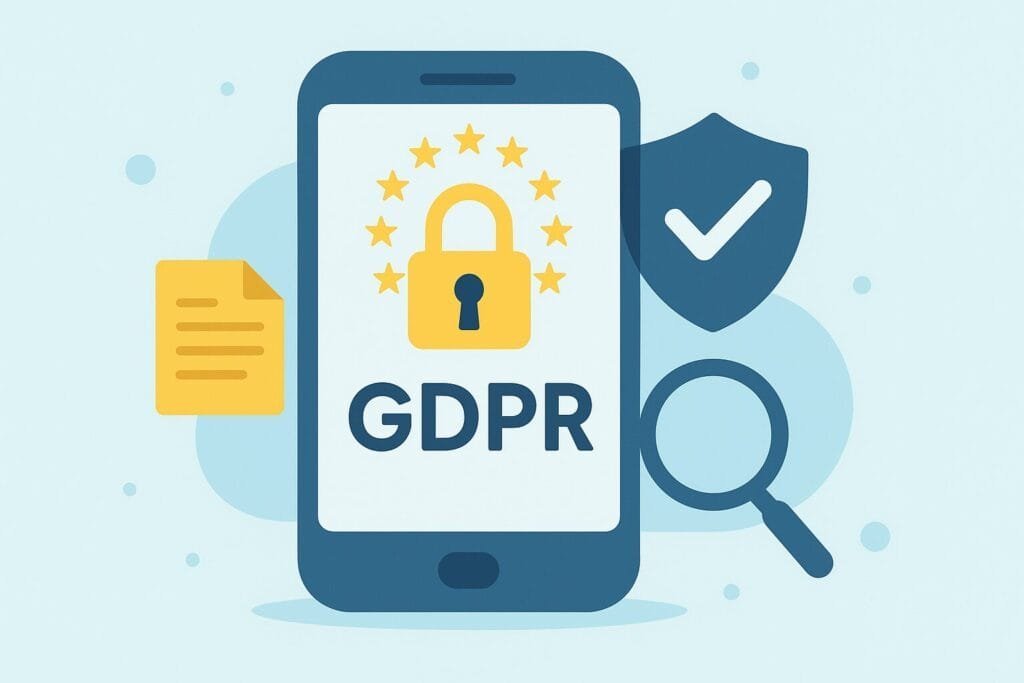What Is GDPR and Why It Matters in Mobile Apps? This question is critical for every mobile app developer, business owner, and even users who value their privacy. The General Data Protection Regulation (GDPR) is a legal framework established by the European Union (EU) in 2018. It governs how organizations collect, process, and store personal data of EU citizens, regardless of where the company is located. If your mobile app handles personal data, understanding and applying GDPR compliance is not optional — it is mandatory.

What Is GDPR?
GDPR stands for General Data Protection Regulation. It was designed to give individuals greater control over their personal data while ensuring that organizations handle this data responsibly. GDPR applies to all companies worldwide that deal with personal data of EU residents. That means even if your mobile app is developed in Asia or the United States, as long as it has users from the EU, you must comply with GDPR.
Why GDPR Matters in Mobile Apps
Mobile apps are one of the most common platforms for collecting personal data. From login details, geolocation, payment information, to browsing behavior, mobile apps gather massive amounts of user data. Without proper regulations, this data can be misused, leading to privacy violations. GDPR ensures that mobile apps:
- Collect only necessary data
- Obtain clear consent from users
- Provide transparency about how data is used
- Protect data with robust security measures
- Allow users to request deletion or modification of their data
Key GDPR Principles for Mobile Apps
To comply with GDPR, mobile apps must follow these seven principles:
- Lawfulness, fairness, and transparency – Data must be collected legally and users must be informed.
- Purpose limitation – Data should be collected for specific, explicit purposes only.
- Data minimization – Only necessary data should be collected.
- Accuracy – Personal data must be accurate and updated regularly.
- Storage limitation – Data should not be stored longer than needed.
- Integrity and confidentiality – Proper security must protect the data.
- Accountability – Developers must prove compliance.
GDPR Compliance Checklist for Mobile Apps
Here are steps mobile app developers should follow to ensure GDPR compliance:
- Request user consent before collecting any data
- Provide a clear and accessible privacy policy
- Allow users to opt-out or delete their data
- Implement strong encryption and security measures
- Notify users in case of a data breach
- Enable “data portability” so users can download their information
Benefits of GDPR Compliance for Mobile Apps
While some developers may see GDPR as a challenge, it actually brings long-term benefits:
- Builds trust – Users are more likely to use your app if they know their data is safe.
- Enhances reputation – A compliant app reflects professionalism and responsibility.
- Reduces risks – Avoids legal penalties and reputational damage.
- Improves security – Stronger security measures protect both your app and users.
GDPR Penalties for Non-Compliance
Failure to comply with GDPR can result in significant fines. The penalties can reach up to €20 million or 4% of global annual revenue, whichever is higher. For startups and independent developers, these fines can be devastating. That is why GDPR compliance must be taken seriously in the mobile app industry.
Comparison: GDPR vs. Other Data Protection Laws
Different regions have their own data protection laws. Below is a comparison between GDPR, CCPA (California Consumer Privacy Act), and LGPD (Brazil’s General Data Protection Law):
| Aspect | GDPR (EU) | CCPA (California, USA) | LGPD (Brazil) |
|---|---|---|---|
| Scope | Applies to all companies processing EU residents’ data | Applies to businesses serving California residents | Applies to companies handling Brazilian citizens’ data |
| User Rights | Access, rectification, deletion, portability | Right to know, delete, and opt-out of data selling | Access, correction, deletion, portability |
| Penalties | Up to €20M or 4% of annual global revenue | Up to $7,500 per violation | Up to 2% of revenue or 50 million reais |
| Consent | Explicit consent required | Opt-out system | Explicit consent required |
How to Make Your Mobile App GDPR Compliant
If you are a mobile app developer, here are best practices to apply immediately:
- Update your privacy policy with GDPR-specific details.
- Implement cookie consent banners for tracking technologies.
- Use data anonymization whenever possible.
- Train your development team about GDPR compliance.
- Work with third-party services that are GDPR compliant.
Conclusion
GDPR is not just a regulation; it is a foundation for building trust between businesses and users. For mobile app developers, compliance is not only a legal obligation but also a competitive advantage. By respecting users’ privacy, you not only avoid penalties but also create an environment where people feel safe using your app. To learn more, you can explore the official GDPR website for detailed information.

